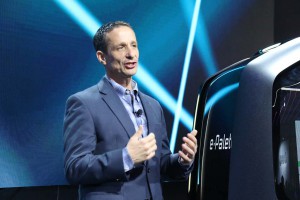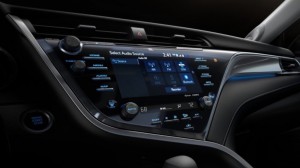
Toyota's Zack Hicks explains how Toyota Connected will use Amazon's Alexa to supplement its system already in place.
Amazon’s personal voice assistant, Alexa, is showing up in a lot of places at this year’s Consumer Electronics Show in Las Vegas this week, including the Toyota stand, the Japanese automaker the latest to integrate the virtual reality technology into its vehicles.
In the coming months, the automaker announced Monday, it will begin offering access to Alexa on “select” Toyota and Lexus models, and the plan is to expand the line-up over the coming years.
“Voice services are rapidly becoming more popular and through our integration with Amazon Alexa, Toyota and Lexus customers will soon be able to easily speak to Alexa in their cars while on-the-go,” said Zack Hicks, the head of Toyota Connect, the Japanese automaker’s data and digital services subsidiary.
Alexa is the most widely used of the new voice assistants, though Google Home is rapidly picking up momentum and Apple is expected to launch its own system in the months ahead. With a simple voice command a user can access an array of information, such as weather, news or sports scores, play games and plug into thousands of “skills,” the Alexa version of a smartphone app.
(GM Marketplace will let you order coffee, donuts, even make reservations while driving. Click Here for the story.)
While Toyota isn’t the first to integrate the technology into its vehicles – Alexa can be called up in various Ford, BMW, Hyundai and Mercedes-Benz models, as well – it claims to be the first automaker to allow two-way use of the service. A motorist can ask Alexa to play music, order a cup of coffee from a nearby Starbuck’s, or operate various home automation devices, turning up the thermostat or turning on the lights at home, for example.
But Toyota will also allow a motorist to use the system from home. Among other things they’ll be able to remotely start the vehicle, unlock its doors or even check fuel levels, for example.
The Amazon Alexa service will supplement, rather than replace Toyota’s own, onboard voice recognition system which can be used to plug a destination into the car’s navigation system or change radio stations, among other things.
But where motorists typically have to learn fairly rigid voice commands to operate the onboard enTune system, Alexa can understand and respond to much more natural speech, while also offering a much wider array of services and functions.
(Click Here for more about Ford teaming up with Alexa.)
Automakers have come to accept the idea that motorists want seamless integration of the various technologies they use regularly in daily life, but that means going beyond just allowing a smartphone to pair up with a car’s hands-free phone system.
“People tell us they love Alexa in the home,” said John Scumniotales, the head of product for Amazon Alexa. “They also want it everywhere they are during the day.”
Several automakers, notably including Ford, are taking advantage of Alexa’s ability to conduct e-commerce. The Detroit automaker now allows a motorist to order a cup of coffee from Starbucks through Alexa, or a pizza from Domino’s. General Motors plans to offer even more expanded e-commerce applications when it finishes integrating the Amazon service into its new GM Marketplace in the months to come. The Marketplace already allows a driver to order beverages and food from some partners, while also reserving a hotel room or an airline ticket.
“Downstream benefits like e-commerce” could eventually become a substantial source of revenue, acknowledged Scumniotales, especially when autonomous and fully driverless vehicles become part of everyday reality.
(To see more about Nissan connecting with Alexa, Click Here.)
Travelers, it seems, will need something to do when they don’t actually have to worry about driving. And that could become a major new source of revenue.

